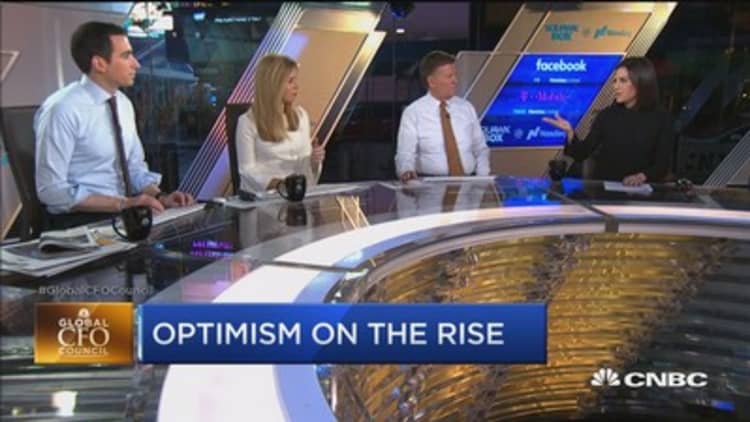
A majority of North American CFOs (54.2 percent) say they support the passage of the Tax Cuts and Jobs Act, which the Senate is expected to vote on Friday, but they also revealed a truth about the limits of trickle-down economics that won't make American workers happy: If tax reform passes, don't expect a raise.
Only one-third of CFOs (33.4 percent) said they think corporate tax reform will lead to increased wages for workers. Twenty-one percent of CFOs said the tax-reform plan will not lead to higher wages, while 45.8 percent were ambivalent or were uncertain of the bill's effect on worker pay.
CFOs are confident that the bill's reforms will have a positive impact on U.S. economic conditions. In addition, 70.9 percent agree (29.2 percent strongly) that corporate tax reforms will create more U.S. jobs, while 83.3 percent agree (20.8 percent strongly) that corporate tax reforms will stimulate U.S. economic growth.
The CNBC Global CFO Council represents some of the largest public and private companies in the world, collectively managing more than $4 trillion in market capitalization across a wide variety of sectors. The quarterly poll was conducted from Nov. 3–Nov. 16. Questions about tax reform were asked of North American members only.
North American CFOs have frequently cited corporate tax reform as the most important issue to their companies. After President Donald Trump was elected in November 2016, 73.9 percent of CFOs said corporate tax reform should be his administration's No. 1 priority. But for the last 12 months, they have remained skeptical that the Republican-controlled Congress can make it happen.
On Thursday the Joint Committee on Taxation projected that the Senate plan would add $1 trillion to the deficit, but GOP leaders said Friday they remain confident about a successful vote. Measures reportedly being debated to make up the budget gap include increasing the proposed corporate rate above 20 percent — something Trump and influential corporate donors, including the Koch brothers, are dead-set against. Or possibly raising the rate on repatriated assets — cash held overseas by corporations.
Roughly 46 percent of CFOs in the survey group said their company's effective tax rate won't be lower in 2018 compared to 2017, a sign that some are unsure about tax reform passing, while other companies already may be paying lower effective tax rates.
Repatriation
A year ago repatriation of overseas cash ran a distant second in terms of administration priorities for CFOs, with 17.4 percent of U.S. CFOs calling for a repatriation holiday or permanent lower tax on overseas profits brought back to the United States.
Now just under 46 percent of U.S. CFOs say they would take advantage of the tax plans reduced rate to repatriate some or all of their repatriated cash. And 8.3 percent say they would not take advantage, while another 37.5 percent say their firms are not holding a significant amount of cash overseas.
Asked what they would do with the repatriated funds, 29.2 percent say they would buy back stock, the most popular response. The percentage of those who use overseas cash to invest in new plants, equipment or technology: 20.8 percent, compared to 12.5 percent who would raise dividends. Only 8.3 percent plan to use repatriated cash to increase headcount.
Other big business stories this year
While 20 percent of respondents answered "tax reform" to the open-ended question, "What is the biggest business news story of 2017?," another said "euro strengthening" is the biggest story alongside tax reform.
Brexit was the next most common answer among the global council and, not surprisingly, the most common response among EMEA CFOs.
Other CFOs cited a wide range of stories as the most important business news story of the year, including multiple responses about Trump, ranging from "Trump impact on financial markets" to "Trump presidency and resulting uncertainty" to "Washington dysfunction."
The CNBC survey of CFOs across the globe found that chief financial officers think bitcoin "is for real," but many also think the digital currency is in a bubble.





